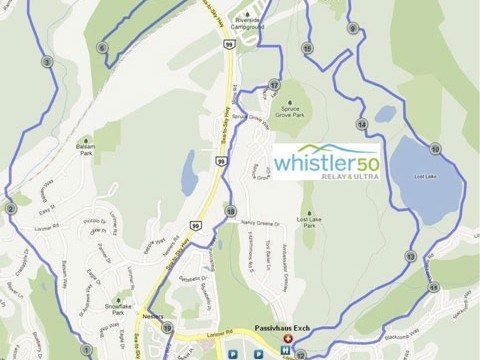The first running of the Whistler 50 Relay and Ultra taking place this Saturday is doing pretty well for a first year event with almost 160 teams of eight and 50 solo runners registered at press time. That's slightly ahead of what organizers at BC Athletics were expecting when they pulled the plug on the Haney to Harrison Relay and Ultra after 29 years and moved their end-of-season event to Whistler.
"Realistically, we were hoping for about 150 teams and it looks like we'll have 160 teams in total, which is great," said Maurice Wilson of BC Athletics. "The ultra has certainly proved to be very popular - we closed that off when we hit the cap of 50 entries, which is more than we would get for the Haney to Harrison.
"With a new venue we never really felt we would get quite as many this first year, but once it establishes itself we think it has the potential to grow."
The Haney to Harrison run, which measured 100 kilometres from Haney to Harrison Hot Springs, had topped 300 teams about 10 years ago, although the numbers were dropping from year to year to a total of 200 teams. Because of logistics, Wilson said event organizers started to look for alternatives a few years ago.
"A lot had changed since the event first started out with 20 or 30 teams," said Wilson. "It had grown to 200-plus teams, and at the same time the population of the valley was growing, as well as traffic, and safety in general was becoming a real concern - particularly running down a major highway like the Lougheed and trying to cross it at two points. We were also limited in Harrison Hot Springs at the finish in terms of being able to provide accommodation and dining options. Having the post-race party in Aggasiz also meant bussing people back and forth. So logistically it was becoming pretty awkward to organize."
Whistler is the opposite in many ways, said Wilson, "which solves most of the problems we were having."
"We're off the roads now, other than the four road crossings on each loop, and there are all the options for accommodation and dining, and having everything on site. You could park your car and walk to all of our venues from there."
The race could also get by with fewer volunteers and exchange points to set up, including washroom facilities, etc.
The one change that could be seen as negative was the decision to have two exchange points for relay teams instead of one. Wilson said that will change the team dynamics, where before runners would pack into vehicles and drive from exchange point to exchange point. They did consider having a single exchange point, but in the end decided that two exchange points - the Whistler Conference Centre and Whistler Passiv Haus -worked better for the course.
"(With one point) we would need to keep people occupied while the runner is out on the course, but having that two exchange solution allows the rest of the team to walk back and forth through the village, buy coffees, support local businesses - it gives people something to do, rather than having a single exchange in a parking lot or at the Olympic Plaza where people would hang around in between the legs."
There are two loops on the course leaving from each exchange point, one measuring 12 kilometres, the other 8km. The course in Whistler is shorter at 50 miles (80km) but that's an advantage over Haney to Harrison where legs ranged from 6km to 15km.
On the ultra side, Wilson said the feedback has been positive so far - and runners don't seem to mind doing four laps of the route.
"Clearly the number of entries are up," he said. "One reason is that the Haney to Harrison was a 100km point-to-point race along the highway, so you're dealing with traffic the whole race. I think trail runners prefer a little variety, and there's a pretty good mix here - some of it's on the valley trail, there are gravel sections around Lost Lake. I also think the shorter distance was appealing to them."
The fastest teams are expecting times around four hours and 15 minutes, while slower teams are estimating between nine and 10 hours on course. For ultra runners, predictions are between six and 12 hours.
There are three Sea to Sky athletes doing the full ultra distance; Whistler's Christine Suter and Squamish athletes Margreet Dietz and Jen Segger. Suter is running to raise funds for the Whistler Adaptive Sports Program (www.whistleradaptive.com).
The ultra runners will spend their first hour-and-a-half in the dark, starting at 6 a.m. while the relay teams start at 8 a.m. No last-minute registration is available.
For more information on the race and course, visit www.bcathletics.org/whistler50/.




